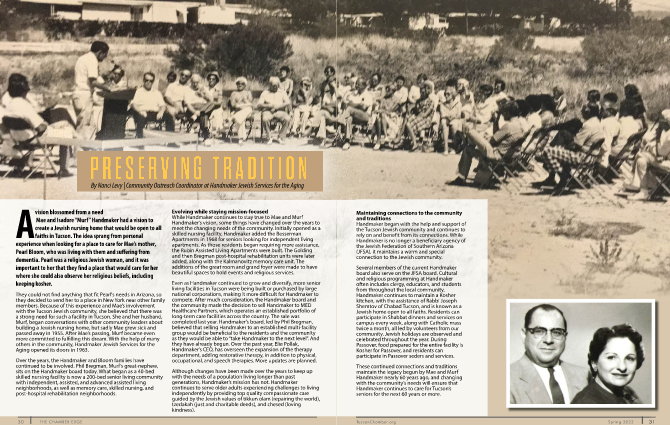SIGN IN

Preserving Tradition: The legacy of Handmaker Jewish Services for the Aging
Preserving Tradition
By Nanci Levy | Community Outreach Coordinator at Handmaker Jewish Services for the Aging
A vision blossomed from a need
Mae and Isadore “Murf” Handmaker had a vision to create a Jewish nursing home that would be open to all faiths in Tucson. The idea sprang from personal experience when looking for a place to care for Mae’s mother, Pearl Bloom, who was living with them and suffering from dementia. Pearl was a religious Jewish woman, and it was important to her that they find a place that would care for her where she could also observe her religious beliefs, including keeping kosher.
They could not find anything that fit Pearl’s needs in Arizona, so they decided to send her to a place in New York near other family members. Because of this experience and Mae’s involvement with the Tucson Jewish community, she believed that there was a strong need for such a facility in Tucson. She and her husband, Murf, began conversations with other community leaders about building a Jewish nursing home, but sadly Mae grew sick and passed away in 1955. After Mae’s passing, Murf became even more committed to fulfilling this dream. With the help of many others in the community, Handmaker Jewish Services for the Aging opened its doors in 1963.
Over the years, the Handmaker and Bloom families have continued to be involved. Phil Bregman, Murf’s great-nephew, sits on the Handmaker board today. What began as a 40-bed skilled nursing facility is now a 200-bed senior living community with independent, assisted, and advanced assisted living neighborhoods, as well as memory care, skilled nursing, and post-hospital rehabilitation neighborhoods.
Evolving while staying mission-focused
While Handmaker continues to stay true to Mae and Murf Handmaker’s vision, some things have changed over the years to meet the changing needs of the community. Initially opened as a skilled nursing facility, Handmaker added the Besserman Apartments in 1968 for seniors looking for independent living apartments. As those residents began requiring more assistance, the Rubin Assisted Living Apartments were built. The Golding and then Bregman post-hospital rehabilitation units were later added, along with the Kalmanovitz memory care unit. The additions of the great room and grand foyer were made to have beautiful spaces to hold events and religious services.
Even as Handmaker continued to grow and diversify, more senior living facilities in Tucson were being built or purchased by large national corporations, making it more difficult for Handmaker to compete. After much consideration, the Handmaker board and the community made the decision to sell Handmaker to MED Healthcare Partners, which operates an established portfolio of long-term care facilities across the country. The sale was completed last year. Handmaker’s board, led by Phil Bregman, believed that selling Handmaker to an established multi-facility group would be beneficial to the residents and the community as they would be able to “take Handmaker to the next level”. And they have already begun. Over the past year, Elie Pollak, Handmaker’s CEO, has overseen the expansion of the therapy department, adding restorative therapy, in addition to physical, occupational, and speech therapies. More updates are planned.
Although changes have been made over the years to keep up with the needs of a population living longer than past generations, Handmaker’s mission has not. Handmaker continues to serve older adults experiencing challenges to living independently by providing top-quality compassionate care guided by the Jewish values of tikkun olam (repairing the world), tzedakah (just and charitable deeds), and chesed (living kindness).
Maintaining connections to the community and traditions
Handmaker began with the help and support of the Tucson Jewish community and continues to rely on and benefit from its connections. While Handmaker is no longer a beneficiary agency of the Jewish Federation of Southern Arizona (JFSA), it maintains a warm and special connection to the Jewish community.
Several members of the current Handmaker board also serve on the JFSA board. Cultural and religious programming at Handmaker often includes clergy, educators, and students from throughout the local community. Handmaker continues to maintain a Kosher kitchen, with the assistance of Rabbi Joseph Shemtov of Chabad Tucson, and is known as a Jewish home open to all faiths. Residents can participate in Shabbat dinners and services on campus every week, along with Catholic mass twice a month, all led by volunteers from our community. Jewish holidays are observed and celebrated throughout the year. During Passover, food prepared for the entire facility is Kosher for Passover, and residents can participate in Passover seders and services.
These continued connections and traditions maintain the legacy begun by Mae and Murf Handmaker nearly 60 years ago, and changing with the community’s needs will ensure that Handmaker continues to care for Tucson’s seniors for the next 60 years or more.
To HERE read the entire Chamber Edge: Legacy Edition.
